|
Search our Site:
|
|

IPCC Reports
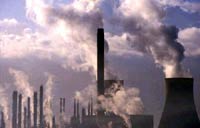 Three comprehensive studies have been issued by the UN Intergovernmental Panel on Climate Change (IPCC) over the past year. The Synthesis Report, released, November 2nd, at a meeting in Copenhagen, caps work on the fifth assessment of climate science and mitigation from the IPCC has completed since 1990.
Three comprehensive studies have been issued by the UN Intergovernmental Panel on Climate Change (IPCC) over the past year. The Synthesis Report, released, November 2nd, at a meeting in Copenhagen, caps work on the fifth assessment of climate science and mitigation from the IPCC has completed since 1990.
The reports demonstrate that “we have the means to limit climate change,” said Rajendra Pachauri, chair of the IPCC, in a statement. “The solutions are many and allow for continued economic and human development. All we need is the will to change, which we trust will be motivated by knowledge and an understanding of the science of climate change.”
The IPCC's Fifth Assessment Synthesis Report, summarizes the three reports released over the past year on the physical science; impacts, adaptation and vulnerability; and mitigation.
The results offer up a stark choice. Unless we quickly curtail our fossil fuel dependence, we face "further warming and long-lasting changes in all components of the climate system, increasing the likelihood of severe, pervasive and irreversible impacts for people and ecosystems."
The IPCC’s Working Group I on the physical science of climate change found no evidence that greenhouse warming has stopped, as climate deniers keep extolling. A brief pause of the upward climbing trend in temperatures might have happened in the last decade, but brief is all it was. The unrelenting upward trend of temperature of the past 40 to 50 years has not stopped at all. The years from 2002 to 2012 were the hottest on record despite ocean cooling in the Pacific Ocean.
“Warming of the climate system is unequivocal,” the report concludes.
View Climate Change 2014: Impacts, Adaptation, and Vulnerability
View November 13, 2014 David Suzuki Foundation article
View November 11, 2014 Huffington Post article
View November 10, 2014 USA Today article
View November 8, 2014 The Telegraph article
View November 2, 2014 Grist article
View November 2, 2014 Climate Code Red article
View November 2, 2014 The Guardian article
View November 2, 2014 American Association for the Advancement of Science article
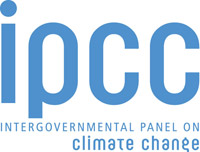 Every five years, the Intergovernmental Panel on Climate Change (IPCC), a United Nations body, is assigned the task of compiling a report based on five years of recent knowledge on the earth's changing climate. The analysis is broken into three main reports with three bodies of scientists and experts; the socio-economic implications, the scientific analysis, and the technical aspects of a changing climate. Finally, these three sections, once complete, are compiled into a final report, entitled the Fifth Assessment Report - Climate Change 2014: Impacts, Adaptation and Vulnerability.
Every five years, the Intergovernmental Panel on Climate Change (IPCC), a United Nations body, is assigned the task of compiling a report based on five years of recent knowledge on the earth's changing climate. The analysis is broken into three main reports with three bodies of scientists and experts; the socio-economic implications, the scientific analysis, and the technical aspects of a changing climate. Finally, these three sections, once complete, are compiled into a final report, entitled the Fifth Assessment Report - Climate Change 2014: Impacts, Adaptation and Vulnerability.
Working Group 1, the Physical Science Basis, met in Stockholm, Sweden, and published their report in September 2013. Currently, Working Group 2 is in Yokohama, Japan finalizing their report before the March 31, 2014 publication date. Although the findings have not been fully revealed, some leaks public and certain messages and overall points have been identified. Working Group 3 will be in Berlin, Germany, April 7 – 11, 2014. Each Working Group Report is released, including with a policy summary. The complete report will be published in Copenhagen, Denmark from the 27 -31 of October, 2014.
One of the proven Working Group 2 findings is that coastal, equatorial Asian cities will be most affected by climate change due to the flooding, storms, and rising sea levels predicted to occur due to warming temperatures. Extreme ocean waves ravaging coastlines will result in many lost homes, displaced families, and contaminated drinking water, which in turn will trigger disease and famine, especially in impoverished areas. In contrast, wealthy countries such as the United Kingdom, the United States and Canada will escape these most severe effects of climate change, despite the fact their carbon emissions are largely the root of the climate problem.
Sobering reports by the scientists predict that hundreds of millions of people will be affected by coastal flooding and land loss as sea levels rise. Additionally, cities will face particular problems with increasing temperatures and increasing populations. The report states with high confidence that,
"Heat stress, extreme precipitation, inland and coastal flooding, as well as drought and water scarcity, pose risks in urban areas with risks amplified for those lacking essential infrastructure and services or living in exposed areas."
Other complications due to climate change predicted to occur include: slowed economic growth, lowered global food security, new poverty traps, increased forest fires, lowered overall human health, higher risk of disease, decreased yields in major food crops (a decline of up to 2% a decade for maize, wheat and rice), and countless severe environmental impacts. One example already being witnessed is the bleaching of biologically rich coral reefs, due to the decomposition of carbon dioxide in the oceans – leading to warmer, more acidic water conditions.
The two most important take home messages to come from this Fifth Assessment report are the immediate action that must be taken now to ensure as positive a future as possible. Firstly, if carbon pollution is not rapidly and effectively reduced, the impacts from climate change are going to be extremely severe, with billions of people negatively affected. Secondly, in order to deal with problems brought on by climate change, adaptation is necessary. This means the wealthy countries most responsible for climate change have an obligation to support adaptation in less developed countries that are in dire need of help.
View February 2014 Intergovernmental Panel on Climate Change report
View March 28, 2014 The Guardian article
View March 28, 2014 The Guardian article
View March 25, 2014 Common Dreams article
View Intergovernmental Panel on Climate Change media centre
 The Twenty-Eighth Session of the Intergovernmental Panel on Climate Change was held April 9-10, 2008 in Budapest, Hungary. The meetings focused on the future of the IPCC, including structure of the IPCC Bureau and the bureau of the Task Force on National Greenhouse Gas Inventories (TFB), as well as key aspects of its work programme for the next several years.
The Twenty-Eighth Session of the Intergovernmental Panel on Climate Change was held April 9-10, 2008 in Budapest, Hungary. The meetings focused on the future of the IPCC, including structure of the IPCC Bureau and the bureau of the Task Force on National Greenhouse Gas Inventories (TFB), as well as key aspects of its work programme for the next several years.
View a Brief History of the IPCC
The meeting was the first since release of the Fourth Assessment Report November 2007 and brought together governments, lead authors, UN agencies, non-governmental organizations, industry and academia.
The IPCC decided to prepare a Fifth Assessment Report (AR5), continue Task Force on National Greenhouse Gas Inventories (TFI) and Task Group on Data and Scenario Support for Impact and Climate Assessment (TGICA). The IPPC will also retain the current Working Groups structure.
View IISD webpage for 28th Session of Intergovernmental Panel on Climate Change
View IISD's Earth Negotiations summary, 28th Session of Intergovernmental Panel on Climate Change
View IPCC webpage for 28th Session of Intergovernmental Panel on Climate Change
IPCC Fifth Assessment Report (AR5)
Other Reports
The Panel adopted the Technical Paper on Climate Change and Water.
 Download IPCC Technical Paper on Climate Change and Water (PDF) Download IPCC Technical Paper on Climate Change and Water (PDF)
The IPPC also agreed to the preparation of a Special Report on Renewable Energy, to be completed by 2010. A scoping meeting for the possible special report on renewable energy took place January 21-25, 2008 in Lübeck, Germany. The suggested structure of the special report includes five sections:
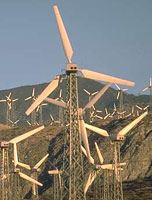
- renewable energy and climate change;
- energy sources;
- integration of renewable energy into energy systems;
- renewable energy in the context of sustainable development;
- mitigation potential and costs; and
- policy, financing and implementation
 Download IPCC Scoping Paper for the Special Report on Renewable Energy Sources and Climate Change Mitigation (PDF) Download IPCC Scoping Paper for the Special Report on Renewable Energy Sources and Climate Change Mitigation (PDF)
The Panel also considered a proposal for the use of the funds from the Nobel Peace Prize, which was jointly awarded to the IPCC and Al Gore in 2007. Three activities have been proposed for use of Nobel Prize funds:
- dissemination of IPCC knowledge and collection of further knowledge on current vulnerabilities and coping capacities;
- support for scientists in developing countries; and
- preparation of a special report on climate change and peace.
The IPCC decided to defer discussion on the use of its Nobel Prize funds until IPCC-29 in September 2008.
 Download Proposal for Use of Funds from the Nobel Peace Prize (PDF) Download Proposal for Use of Funds from the Nobel Peace Prize (PDF)
The next session of the IPCC is scheduled to take place in Geneva, Switzerland, from 1-4 September 2008.
Visit the IPCC website
Source: IISD
 The IPCC's Fourth Assessment Report (AR4) "Climate Change 2007" - a 1,500 page scientific assessment - was released in stages throughout 2007. The February 2007 report from IPCC Working Group I (section below) was the first of four major reports during 2007 from the IPCC that comprise AR4. Its focus was on presenting a comprehensive picture of climate science and it concluded - with 90% certainty - that humans are the main cause of warming since 1950.
The IPCC's Fourth Assessment Report (AR4) "Climate Change 2007" - a 1,500 page scientific assessment - was released in stages throughout 2007. The February 2007 report from IPCC Working Group I (section below) was the first of four major reports during 2007 from the IPCC that comprise AR4. Its focus was on presenting a comprehensive picture of climate science and it concluded - with 90% certainty - that humans are the main cause of warming since 1950.
The second report - from Working Group II (section below) - released April 6th, details the impacts of global warming and focuses on vulnerable regions, while the third report, released May 4th (section below), examines ways policy makers and scientists might mitigate climate change.
The final Synthesis report (section below) was released on November 17th and synthesizes the previous three reports.
Visit the IPCC website
View an IPCC Fact Sheet on AR4
View all IPCC assessment reports
The Intergovernmental Panel on Climate Change (IPCC), established by the World Meteorological Organization (WMO) and the United Nations Environment Programme (UNEP), assesses scientific, technical and socio-economic information relevant to understanding climate change, its potential impacts and options for adaptation and mitigation. The IPCC also prepares Special Reports and Technical Papers on topics where independent scientific information and advice is deemed necessary. It also supports the UN Framework Convention on Climate Change (UNFCCC) through its work on methodologies for National Greenhouse Gas Inventories.
The First IPCC Assessment Report was completed in 1990. The Report played an important role in establishing the Intergovernmental Negotiating Committee for a UN Framework Convention on Climate Change (UNFCCC) by the UN General Assembly. The UNFCCC was adopted in 1992 and entered into force in 1994. It provides the overall policy framework for addressing climate change.
The IPCC has continued to provide scientific, technical and socio-economic advice to the world community, and in particular to the Parties to the UNFCCC through its assessment reports and special reports. Its Second Assessment Report, Climate Change 1995, provided key input to negotiations, which led to adoption of the Kyoto Protocol to the UNFCCC in 1997.
|
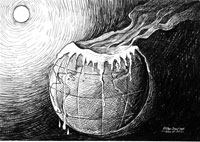
By P. Pismestrovic
politicalcartoons.com
larger version |
The Third Assessment Report (TAR), Climate Change 2001, was completed in 2001 and submitted to the 7th Conference of the Parties to the UNFCCC. The Parties agreed it should be used routinely as a reference for providing information for deliberations on agenda items of the UNFCC Conference of the Parties.
During 2007, the IPCC finalized its Fourth Assessment Report "Climate Change 2007" - a 1,500 page scientific assessment.
|
The reports by the three Working Groups - released throughout the year - provide comprehensive and up-to-date assessments of current knowledge on climate change. The Synthesis Report integrates the information around six topic areas.
- Working Group I assesses the scientific aspects of the climate system and climate change.
- Working Group II assesses the vulnerability of socio-economic and natural systems to climate change, negative and positive consequences of climate change, and options for adapting to it.
- Working Group III assesses options for limiting greenhouse gas emissions and otherwise mitigating climate change.
The 120-plus governments that participate approve all four reports, and IPCC scientists must approve all changes.
 On November 17, 2007, the Intergovernmental Panel on Climate Change (IPCC) released the final installment of its 4th Assessment Report (AR4) for 2007. The Synthesis Report is based on the reports of the three Working Groups of the IPCC and provides an integrated view of climate change explicitly targeted to policymakers.
On November 17, 2007, the Intergovernmental Panel on Climate Change (IPCC) released the final installment of its 4th Assessment Report (AR4) for 2007. The Synthesis Report is based on the reports of the three Working Groups of the IPCC and provides an integrated view of climate change explicitly targeted to policymakers.
The Synthesis Report is designed to be a powerful, scientifically authoritative document of high policy relevance. Delegates to the 13th Conference of the Parties (COP) to the UNFCCC being held in December in Bali, Indonesia will use it as their main guide in negotiating the agreement to follow the Kyoto Protocol. In fact, the Conference was postponed to December to allow the IPCC Synthesis Report to come out first. The UN hopes to have a follow-up treaty to Kyoto in place by 2009.
 Download Summary for Policymakers of AR4 Synthesis Report (PDF) Download Summary for Policymakers of AR4 Synthesis Report (PDF)
The Synthesis Report reinforces climate scientists' consensus that global warming is accelerating and outlines the case for global action to curb greenhouse gas emissions.
Global total annual greenhouse gas emissions from human activities have risen by 70 percent since 1970. Concentrations of carbon dioxide, the main greenhouse gas, far exceed the natural range over the last 650,000 years.
The potential impact of global warming is "so severe and so sweeping that only urgent, global action will do," said UN secretary-general Ban Ki-moon.
In a best-case scenario, temperatures will continue to rise because of the carbon already in the atmosphere, the report said. The Synthesis Report also says that greenhouse gas (GHG) emissions must stabilize by 2015 and decline after that.
"We have already committed the world to sea level rise," said Pachauri, with the report saying the average will be 1.4 metres higher than pre-industrial levels even if factories were shut down and cars taken off the roads. And if the Greenland ice sheet melts, scientists say they can't even predict the sea level rise, other than to say coastal cities would be drowned.
In terms of effects:
- The poor and elderly will suffer most from climate change;
- Hunger and disease will be more common;
- By as early as 2020, 75 million to 250 million people in Africa will suffer water shortages;
- Asia's mega cities will be at risk of river and coastal flooding;
- More animal and plant species will vanish, particularly in Europe;
- North America will see longer and hotter heat waves and more competition for water
 Scientists and climate change experts say options and technologies are available to cut emissions and that it is now up to world leaders, governments and individuals to respond.
Scientists and climate change experts say options and technologies are available to cut emissions and that it is now up to world leaders, governments and individuals to respond.
"This year's scientific report from the UN's Intergovernmental Panel on Climate Change (IPCC) has made clear beyond doubt that climate change is a reality and can seriously harm the future development of our economies, societies and eco-systems worldwide," says a UN briefing note regarding the international climate meeting in Bali in December 2007. "Immediate action is needed to be able to prevent the most severe impacts."
View the IPCC Fourth Assessment Report
View November 17, 2007 UN release
View November 19, 2007 Spiegel Online article
View December 3, 2007 Reuters Factbox
 On May 4, 2007, the Intergovernmental Panel on Climate Change (IPCC) released its third summary report for 2007. The IPCC Working Group III report, Climate Change 2007: Mitigation of Climate Change, is designed as a blueprint for governments to address climate change.
On May 4, 2007, the Intergovernmental Panel on Climate Change (IPCC) released its third summary report for 2007. The IPCC Working Group III report, Climate Change 2007: Mitigation of Climate Change, is designed as a blueprint for governments to address climate change.
The Working Group III report reviews the latest science on costs and ways to curb greenhouse gas (GHG) emissions growth and contains a clear message: Delaying action on climate change is no longer an option and the longer we wait to act, the harder and more expensive the task will be in the future.
 Download the May 2007 Working Group III Contribution to the IPCC Fourth Assessment Report, Climate Change 2007: Mitigation of Climate Change - Summary for Policymakers (PDF) Download the May 2007 Working Group III Contribution to the IPCC Fourth Assessment Report, Climate Change 2007: Mitigation of Climate Change - Summary for Policymakers (PDF)
View a webcast of the May 4, 2007 IPCC press conference: Real Player or Windows Media Player
What is Needed
The May 2007 IPCC report asserts it is possible to halt global warming if the world's emissions start to decline before 2015. Further, it states that a 50%-85% reduction in GHG emissions from 2000 levels must take place by the middle of this century if average global temperature rise is to be kept below 2C, and 'major' impacts avoided. This means that the concentration of CO2 equivalents in the atmosphere must remain below about 450ppm (parts per million). Current atmospheric concentrations are believed to have passed 400 parts per million.
The IPCC also calls attention to the risks of delay. Global GHG emissions have increased by 70% percent since 1970 and if no action is taken, they could rise to nearly double current levels by 2030. For this reason, the IPCC has said that it is imperative for policy makers to discourage older technologies (e.g. coal-fired power plants).
Even the target level of a 2°C increase could mean that up to 2 billion people will face water shortages by 2050 and 20% to 30% of the world's species could be threatened with extinction, according to the IPCC.
Cost?
The IPCC acknowledge it will take serious effort and cost to combat climate change, however it won't cost as much as many have been claiming. Most important, significant progress toward stabilizing and reducing emissions can be achieved using known technologies.
The IPCC assessment offers a range of emissions scenarios with associated projected rises in temperature. Under the most stringent scenario, where GHG concentrations are capped at 445 ppm, the experts project an economic loss of under 3% percent of global gross domestic product (GDP) by 2030, that is, spread over 23 years. In other words, limiting the rise in temperatures to within 2C would cost only 0.12% of annual GDP. As well, some measures and mechanisms to combat climate change (see below) may provide economic boosts.
Action. . .
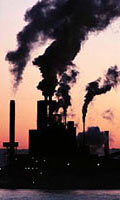 The IPCC Working Group III May 2007 report examines a range of policies shown to be effective for emissions reductions and looks at costs and benefits implementing various policies and instruments.
The IPCC Working Group III May 2007 report examines a range of policies shown to be effective for emissions reductions and looks at costs and benefits implementing various policies and instruments.
It cautions major investments in new low or no-emissions energy sources will be required in the coming century. The IPCC also emphasizes the problem can and must be addressed now with existing technical tools. The report also stresses that average citizens can make valuable contributions by adopting lifestyle changes.
IPCC chairman, climatologist Dr. Rajendra Pachauri observed economic incentives are needed to drive any technological transformation. "Technology alone will not be enough and in any case, technology has a clear connection with government policy... Incentives... must come from taxes or a carbon price."
Some of the ready to implement 'solutions' discussed in the report:
- energy efficiency standards - for cars, buildings, factories, homes and appliances
- investing in alternative fuels that show near-term promise
- investing in and subsidizing renewable energy sources
- reducing deforestation and protecting forests as "carbon sinks"
- capping agricultural emissions
- fuel, road and auto taxes
- investment in public transportation
- ensuring massive growth expected in developing nations, is cleaner and sustainable
The IPCC report also notes that voluntary agreements by industries to cut emissions for the most part "have not achieved significant emissions reductions beyond business as usual."
A cap and trade system is discussed in the IPCC report as a primary policy instrument for reducing GHG concentrations. This would involve governments capping emissions and charging polluters for every ton of carbon dioxide beyond that point, forcing companies to cut emissions and invest in energy efficiency and alternative fuels.
View May 4, 2007 Associated Press article
View May 4, 2007 Guardian Unlimited article
View May 4, 2007 BBC News article
View May 3, 2007 CBC article
 On April 6, 2007, the Intergovernmental Panel on Climate Change (IPCC) released its second 2007summary report. The IPCC Working Group II report, Climate Change 2007: Climate Change Impacts, Adaptation and Vulnerability, focuses on how global warming is changing life on Earth; impacting ecological processes and people; identifying species and regions at greatest risk while describing options for limiting risks.
On April 6, 2007, the Intergovernmental Panel on Climate Change (IPCC) released its second 2007summary report. The IPCC Working Group II report, Climate Change 2007: Climate Change Impacts, Adaptation and Vulnerability, focuses on how global warming is changing life on Earth; impacting ecological processes and people; identifying species and regions at greatest risk while describing options for limiting risks.
The language used in the press to convey findings of the report reflects the urgency of taking serious measures to address climate change, Moving the attention and concern of the general public to the matter is also a priority. The following are terms and phrases used to describe the IPCC report:
 "near-apocalyptic vision of Earth's future"
"near-apocalyptic vision of Earth's future"
"devastating effects"
"dire threats"
"grim"
"frightening impact"
"bleak picture of our world's future"
"bleakest report ever on global warming"
 The language is not an exaggeration. This is the first time scientists can conclude with a high degree of confidence that measurable regional effects of climate change are evident on all of earth's continents, with measurable global effects on ecosystems and human populations. The quote by Dr. Martin Parry, co-chairman of the team that authored the April 2007 report, made this point "We're no longer arm-waving with models," he said. "This is empirical information on the ground." Human activities are having discernable impacts on animals and plants - now.
The language is not an exaggeration. This is the first time scientists can conclude with a high degree of confidence that measurable regional effects of climate change are evident on all of earth's continents, with measurable global effects on ecosystems and human populations. The quote by Dr. Martin Parry, co-chairman of the team that authored the April 2007 report, made this point "We're no longer arm-waving with models," he said. "This is empirical information on the ground." Human activities are having discernable impacts on animals and plants - now.
The key findings of the report emphasize observed and projected impacts of climate change, including accumulating evidence that changes in many physical and biological systems are linked to anthropogenic (human caused) warming. The report predicts the following:
- Up to 30% of species will face extinction if global temperatures rise 1.5 to 2.5 degrees Celsius above the average recorded in the 1980s and '90s.
- Areas currently suffering from shortage of rain will become even drier, increasing the risks of hunger and disease.
- In Africa, climate change could create a drastic fall in crop yields, meaning hunger for millions.
- The world will face heightened threats of flooding, more severe storms and coastline erosion that could affect billions.
- Climate change could also thaw Himalayan glaciers and usher in heat waves for Europe and North America.
Dr. Parry identified areas most affected as the Arctic, sub-Saharan Africa, small islands and Asia's sprawling, crowded, flood-prone river deltas.
Africa will be hardest hit; by 2020, up to 250 million people are likely to be exposed to water shortages. In some countries, food production could fall by half. Parts of Asia are threatened with massive flooding and avalanches from melting Himalayan glaciers. Europe also will see its Alpine glaciers disappear. Australia's Great Barrier Reef will lose much of its coral to bleaching from even moderate increases in sea temperatures, the report said.
Impacts in North America
North America will experience more severe storms with human and economic loss, and cultural and social disruptions. It can expect more hurricanes, floods, droughts, heat waves and wildfires. Coasts will be swamped by rising sea levels. In the short term, crop yields may increase by five to 20% from a longer growing season, but will plummet if temperatures rise by 4°F.
Here in Canada, predicted effects include lower water levels in the Great Lakes that could result in hydroelectric problems, more wildfires and more frequent, violent storms in Atlantic Canada. Wildlife, agriculture, forests and the water supply will all be drastically affected. In urban centres such as Toronto, the report predicted more heat waves, potentially killing many elderly and young people.
The report is a convincing argument for Canada and the world to take a two-pronged response to addressing climate change, consisting of: immediate cuts to greenhouse gas emissions, and a strategy to help citizens cope with climate change that has already and will continue to occur.
 The take home message is that devastating effects will strike all regions of the world and all levels of society. Those without resources to adapt to the changes will suffer the most.
The take home message is that devastating effects will strike all regions of the world and all levels of society. Those without resources to adapt to the changes will suffer the most.
It isn't all doom and gloom. In its final pages, the report emphasizes that many of the worst effects aren't locked into the future. People can build better structures, adapt to future warming threats and reduce greenhouse gas emissions, the IPCC scientists said.
IPCC officials also said the existing and projected threats to these regions are justification for a greatly intensified effort by development groups, wealthy countries, and governments in poor countries to increase resilience in regions most at risk.
 Download April 2007 Working Group II Contribution to the Intergovernmental Panel on Climate Change Fourth Assessment Report, Climate Change 2007: Climate Change Impacts, Adaptation and Vulnerability - Summary for Policymakers (PDF) Download April 2007 Working Group II Contribution to the Intergovernmental Panel on Climate Change Fourth Assessment Report, Climate Change 2007: Climate Change Impacts, Adaptation and Vulnerability - Summary for Policymakers (PDF)
Listen to the April 6, 2007 IPCC press conference (WMV)
View IISD's Earth Negotiations Bulletin report for the Eighth Sesssion of Working Group II of the Intergovernmental Panel on Climate Change: 2-6 April, 2007
Visit IPCC website
IPCC Second 2007 Summary Watered Down?
The predictions of the April 2007 IPCC Working Groups II Summary report paint a grim although still somewhat preventable picture of our future. However, the controversy surrounding the process to finalize the report indicates that the report is a toned-down prediction, a compromise brokered in a fierce, around-the-clock debate among scientists and government officials.
366 participants, including scientists, representatives from 120 nations, UN agencies and non-governmental organizations, attended the 5-day meeting, which took place in Brussels, Belgium, from April 2-6, 2007. Each word was approved by consensus, and any change had to be approved by the scientists who drew up that section of the report.
Although there was little doubt about the science, which was based on 29,000 sets of data largely collected in the last five years, some governments, including China, the US and Saudi Arabia, managed to win some weakened wording.
Several scientists objected to the editing of the final draft by government negotiators but ultimately agreed to compromises. However, some scientists vowed never to take part in the process again. In the end, agreement came after an all-night session during which key sections were deleted from the draft and scientists angrily confronted government negotiators who they feared were watering down their findings.
|
|
 In its report released February 2007, the United Nations' Intergovernmental Panel on Climate Change (IPCC) concluded that humans are almost certainly responsible for global warming. Although previous reports have warned of the consequences of unchecked climate change, the international panel has issued its strongest-ever warnings in the 2007 report - of, for instance more droughts, stronger storms and rising sea levels by 2100, making it almost impossible to blame natural forces for global warming.
In its report released February 2007, the United Nations' Intergovernmental Panel on Climate Change (IPCC) concluded that humans are almost certainly responsible for global warming. Although previous reports have warned of the consequences of unchecked climate change, the international panel has issued its strongest-ever warnings in the 2007 report - of, for instance more droughts, stronger storms and rising sea levels by 2100, making it almost impossible to blame natural forces for global warming.
The 21-page report, Climate Change 2007: The Physical Science Basis - Summary for Policymakers, says that human activities are "very likely" the main cause of warming in the last 50 years. Although to a lay-person, "very likely" leaves some room for doubt, in the language of the IPCC, this wording translates into at least a 90% probability. In contrast, the IPCC's 2001 report described the link to human activities as "likely," meaning a 66% to 90% probability.
|
| The report said global warming and a rising sea level will continue for centuries, even if greenhouse gas emissions are slowed or reduced. According to a research scientist at Environment Canada's climate modeling centre, actions to curb greenhouse gas emissions will have an effect on the severity of climate change. The IPCC panel has predicted average temperature increases of 1.8 to four degrees by the year 2100 (a wider range than in the 2001 report). |
Global Temperature Predictions
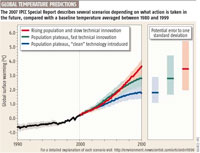
Larger Version |
The message is that what we do now as a planet to reduce emissions can make a difference to the world our children and our children's children will inherit.
|
| The Intergovernmental Panel on Climate Change was created by the UN in 1988 and releases its assessments every five or six years. It has completed three major series of reports - in 1990, 1995, and 2001. 2007 marks the Fourth Assessment Report series. IPCC reports are widely regarded as the authoritative statements of scientific knowledge about climate change and are used as a major source of information for government policy makers. |
The Rise of Man-Made Emissions
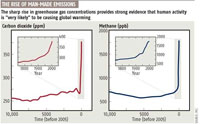
Larger Version |
The February 2007 IPCC report was produced by some 600 authors from 40 countries. Over 620 expert reviewers and a large number of government reviewers also participated. Representatives from 113 governments reviewed and revised the Summary line-by-line before adopting it and accepting the underlying report.
 Download IPCC report, Climate Change 2007: The Physical Science Basis - Summary for Policymakers (PDF) Download IPCC report, Climate Change 2007: The Physical Science Basis - Summary for Policymakers (PDF)
View Main Statistics and Projections from the February 2007 IPCC Report
For other summaries and analysis of the implications of the 2007 IPCC report, we recommend:
|
 2002-2014 2002-2014
|
|

 Three comprehensive studies have been issued by the UN Intergovernmental Panel on Climate Change (IPCC) over the past year. The Synthesis Report, released, November 2nd, at a meeting in Copenhagen, caps work on the fifth assessment of climate science and mitigation from the IPCC has completed since 1990.
Three comprehensive studies have been issued by the UN Intergovernmental Panel on Climate Change (IPCC) over the past year. The Synthesis Report, released, November 2nd, at a meeting in Copenhagen, caps work on the fifth assessment of climate science and mitigation from the IPCC has completed since 1990. Every five years, the Intergovernmental Panel on Climate Change (IPCC), a United Nations body, is assigned the task of compiling a report based on five years of recent knowledge on the earth's changing climate. The analysis is broken into three main reports with three bodies of scientists and experts; the socio-economic implications, the scientific analysis, and the technical aspects of a changing climate. Finally, these three sections, once complete, are compiled into a final report, entitled the Fifth Assessment Report - Climate Change 2014: Impacts, Adaptation and Vulnerability.
Every five years, the Intergovernmental Panel on Climate Change (IPCC), a United Nations body, is assigned the task of compiling a report based on five years of recent knowledge on the earth's changing climate. The analysis is broken into three main reports with three bodies of scientists and experts; the socio-economic implications, the scientific analysis, and the technical aspects of a changing climate. Finally, these three sections, once complete, are compiled into a final report, entitled the Fifth Assessment Report - Climate Change 2014: Impacts, Adaptation and Vulnerability.
 On November 17, 2007, the Intergovernmental Panel on Climate Change (IPCC) released the final installment of its 4th Assessment Report (AR4) for 2007. The Synthesis Report is based on the reports of the three Working Groups of the IPCC and provides an integrated view of climate change explicitly targeted to policymakers.
On November 17, 2007, the Intergovernmental Panel on Climate Change (IPCC) released the final installment of its 4th Assessment Report (AR4) for 2007. The Synthesis Report is based on the reports of the three Working Groups of the IPCC and provides an integrated view of climate change explicitly targeted to policymakers.  Download Summary for Policymakers of AR4 Synthesis Report (PDF)
Download Summary for Policymakers of AR4 Synthesis Report (PDF) Scientists and climate change experts say options and technologies are available to cut emissions and that it is now up to world leaders, governments and individuals to respond.
Scientists and climate change experts say options and technologies are available to cut emissions and that it is now up to world leaders, governments and individuals to respond.

 Download IPCC report, Climate Change 2007: The Physical Science Basis - Summary for Policymakers (PDF)
Download IPCC report, Climate Change 2007: The Physical Science Basis - Summary for Policymakers (PDF) 2002-2014
2002-2014


 The Twenty-Eighth Session of the Intergovernmental Panel on Climate Change was held April 9-10, 2008 in Budapest, Hungary. The meetings focused on the future of the IPCC, including structure of the IPCC Bureau and the bureau of the Task Force on National Greenhouse Gas Inventories (TFB), as well as key aspects of its work programme for the next several years.
The Twenty-Eighth Session of the Intergovernmental Panel on Climate Change was held April 9-10, 2008 in Budapest, Hungary. The meetings focused on the future of the IPCC, including structure of the IPCC Bureau and the bureau of the Task Force on National Greenhouse Gas Inventories (TFB), as well as key aspects of its work programme for the next several years.
 On May 4, 2007, the Intergovernmental Panel on Climate Change (IPCC) released its third summary report for 2007. The IPCC Working Group III report, Climate Change 2007: Mitigation of Climate Change, is designed as a blueprint for governments to address climate change.
On May 4, 2007, the Intergovernmental Panel on Climate Change (IPCC) released its third summary report for 2007. The IPCC Working Group III report, Climate Change 2007: Mitigation of Climate Change, is designed as a blueprint for governments to address climate change. The IPCC Working Group III May 2007 report examines a range of policies shown to be effective for emissions reductions and looks at costs and benefits implementing various policies and instruments.
The IPCC Working Group III May 2007 report examines a range of policies shown to be effective for emissions reductions and looks at costs and benefits implementing various policies and instruments. On April 6, 2007, the Intergovernmental Panel on Climate Change (IPCC) released its second 2007summary report. The IPCC Working Group II report, Climate Change 2007: Climate Change Impacts, Adaptation and Vulnerability, focuses on how global warming is changing life on Earth; impacting ecological processes and people; identifying species and regions at greatest risk while describing options for limiting risks.
On April 6, 2007, the Intergovernmental Panel on Climate Change (IPCC) released its second 2007summary report. The IPCC Working Group II report, Climate Change 2007: Climate Change Impacts, Adaptation and Vulnerability, focuses on how global warming is changing life on Earth; impacting ecological processes and people; identifying species and regions at greatest risk while describing options for limiting risks. "near-apocalyptic vision of Earth's future"
"near-apocalyptic vision of Earth's future" The language is not an exaggeration. This is the first time scientists can conclude with a high degree of confidence that measurable regional effects of climate change are evident on all of earth's continents, with measurable global effects on ecosystems and human populations. The quote by Dr. Martin Parry, co-chairman of the team that authored the April 2007 report, made this point "We're no longer arm-waving with models," he said. "This is empirical information on the ground." Human activities are having discernable impacts on animals and plants - now.
The language is not an exaggeration. This is the first time scientists can conclude with a high degree of confidence that measurable regional effects of climate change are evident on all of earth's continents, with measurable global effects on ecosystems and human populations. The quote by Dr. Martin Parry, co-chairman of the team that authored the April 2007 report, made this point "We're no longer arm-waving with models," he said. "This is empirical information on the ground." Human activities are having discernable impacts on animals and plants - now.  The take home message is that devastating effects will strike all regions of the world and all levels of society. Those without resources to adapt to the changes will suffer the most.
The take home message is that devastating effects will strike all regions of the world and all levels of society. Those without resources to adapt to the changes will suffer the most. In its report released February 2007, the United Nations' Intergovernmental Panel on Climate Change (IPCC) concluded that humans are almost certainly responsible for global warming. Although previous reports have warned of the consequences of unchecked climate change, the international panel has issued its strongest-ever warnings in the 2007 report - of, for instance more droughts, stronger storms and rising sea levels by 2100, making it almost impossible to blame natural forces for global warming.
In its report released February 2007, the United Nations' Intergovernmental Panel on Climate Change (IPCC) concluded that humans are almost certainly responsible for global warming. Although previous reports have warned of the consequences of unchecked climate change, the international panel has issued its strongest-ever warnings in the 2007 report - of, for instance more droughts, stronger storms and rising sea levels by 2100, making it almost impossible to blame natural forces for global warming.